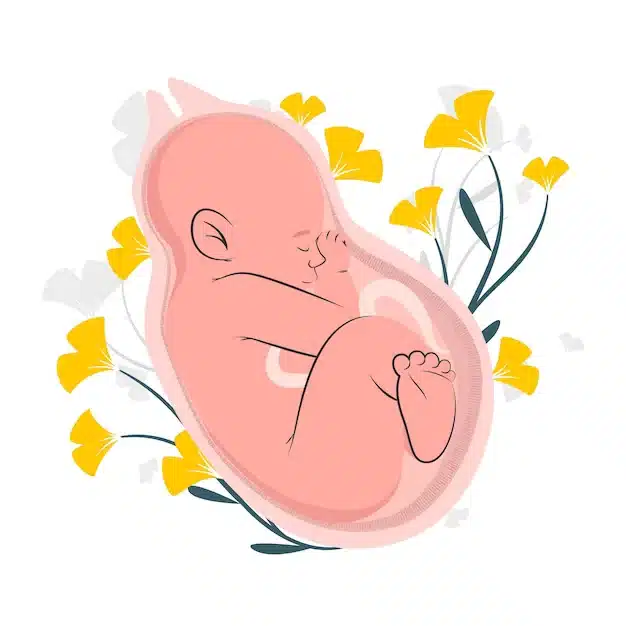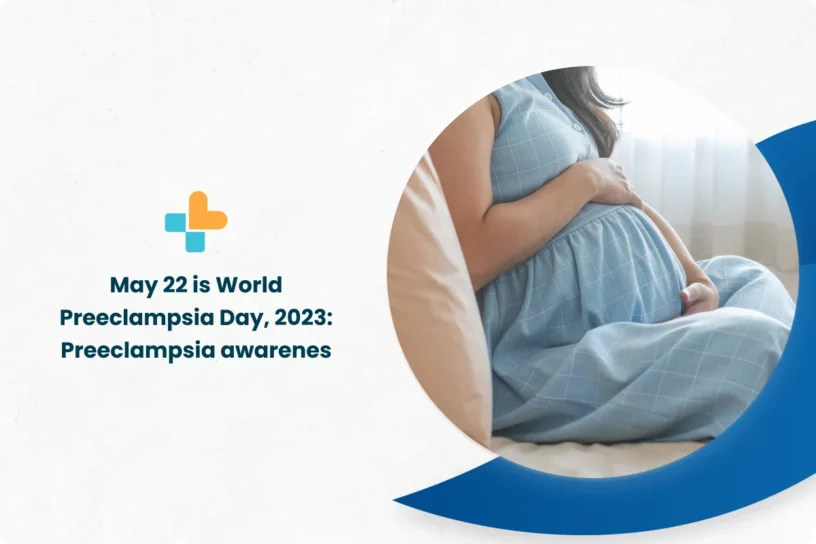World Preeclampsia Day is observed globally every year on May 22. The aim of observing this day is to raise awareness about preeclampsia and to understand this potentially life-threatening pregnancy complication. Preeclampsia and related hypertension diseases affect approximately 76,000 mothers and 500,000 newborns annually. Preeclampsia is a pregnancy complication that is seen around the 20th week of pregnancy.

To create awareness about preeclampsia on this World Preeclampsia Day, let’s learn more about preeclampsia and how to prevent it.
What is preeclampsia?
Preeclampsia is a severe condition that occurs usually in the 20th week of pregnancy. Preeclampsia is a condition that is characterized by elevated blood pressure and protein levels in the urine during pregnancy. This condition can cause harm to both mother and the fetus. Preeclampsia is a condition that requires medical attention as it may also cause harm to other organs in the body.
What are the symptoms of preeclampsia?
In many people, preeclampsia can be asymptomatic. This means that the patient with preeclampsia may not have any noticeable symptoms. The common and primary preeclampsia symptoms are usually elevated blood pressure, proteinuria (excessive protein in the urine), or indications of organ damage, particularly to the kidneys. The symptoms of preeclampsia are typically identified during a regular prenatal check-up with a doctor. The various symptoms of preeclampsia may include the following,
- Thrombocytopenia (reduced blood platelets levels)
- An increase in the liver enzymes
- Pain in the upper abdomen, especially on the upper right side
- Chronic headaches
- Vision changes such as blurred vision or flashing lights
- Swollen hands and face
- Unexplained weight gain
- Shortness of breath as a result of fluid in the lungs
- Nausea and vomiting
- Dizziness
- Shoulder pain
What are the causes of preeclampsia?
The exact cause of preeclampsia remains uncertain, according to experts. However, many researchers believe that preeclampsia is caused due to issues with the development of the placenta. This may occur when the blood vessels supplying the placenta respond abnormally to hormonal signals. This results in narrowed blood vessels and restricted blood flow. Some researchers also speculate that preeclampsia may develop due to poor nutrition and high body fat. Additionally, insufficient blood flow to the uterus may also play be responsible for the development of this condition.

Risk factors of preeclampsia
There are certain risk factors that might increase a woman’s risk of developing preeclampsia. These preeclampsia risk factors include the following,
- Having hypertension
- Having kidney problems
- Preeclampsia in a past pregnancy
- Autoimmune disorders
- Family history of preeclampsia
- Obesity
- Previous pregnancy complications
- Carrying more than one baby
- Having had in vitro fertilization
- Pregnancy with a new partner
- Late pregnancy
Complications of preeclampsia
Preeclampsia can cause certain complications, such as,
- Placental abruption
- Preterm birth
- Restriction of fetal growth
- Eclampsia
- HELLP syndrome
- Damage to organs such as the eyes, heart, brain, liver, kidneys, and lungs
How is preeclampsia treated?
Your healthcare provider will give advice to you about the right treatment for preeclampsia. Depending on the severity of preeclampsia and the stage of the pregnancy, the treatment prescribed may differ. One of the most common treatments for preeclampsia during pregnancy is delivery. By delivering the baby, the preeclampsia condition can be prevented from progressing.
Your baby will probably be born prematurely if you are toward the conclusion of your pregnancy (37 weeks or more). While vaginal delivery is still a possibility, a Caesarean delivery (C-section) may be suggested in some circumstances.
In case the preeclampsia is mild and you are not close to your term, then the doctor may prescribe:
- Taking bed rest at the hospital or home
- Blood tests
- Urine tests
- Medicines for lowering high blood pressure
- Frequent ultrasounds
- Monitoring the fetal heartbeat
Regardless of the gestational stage, urgent delivery of the baby may be required in situations of severe preeclampsia. Preeclampsia symptoms should go away after birth in a matter of one to six weeks. However, they may persist for a longer duration.
How to prevent preeclampsia?
If you are at risk of preeclampsia, then it is advised to talk to your healthcare provider about the various ways to preeclampsia prevention. For preeclampsia prevention, you can follow the below-mentioned tips such as:
- Eating healthily
- Maintaining a healthy weight
- Exercising
- Quitting smoking
- Managing your blood sugar levels
- Managing the levels of blood pressure
- Getting adequate sleep
- Avoiding excessive consumption of salt and caffeine
Your doctor may also recommend you to take a daily low-dose (81 milligrams) aspirin. However, it is crucial to consult with them before taking any medications, vitamins, or supplements.
Frequently Asked Questions
1. Is preeclampsia curable?
No preeclampsia is not curable. The only definitive way of curing preeclampsia is through the delivery of the baby. However, even after birth, the doctor will keep an eye on the patient for a few weeks to make sure the symptoms go away.
2. Will preeclampsia go away after birth?
Preeclampsia often goes away a few days to a few weeks following birth. It is nonetheless possible for high blood pressure to continue for a few weeks after giving delivery, necessitating the use of medication for therapy. In the postpartum period, your healthcare practitioner and you will work together to efficiently control your blood pressure.
Read more: World Ovarian Cancer Day- May 8, 2023
Conclusion
Preeclampsia is a fatal condition that a woman develops during pregnancy. Hence, this World Preeclampsia Day 2023, ensure to educate people, especially pregnant women, about this condition. As preeclampsia can cause harm to both baby and the mother, this World Preeclampsia Day 2023 spread awareness about the various symptoms of preeclampsia to help pregnant mothers find it early. Preeclampsia symptoms and risk factors awareness on World Preeclampsia Day 2023 can help safeguard the life of both mother and child.
At Ayu Health Hospitals, we provide the best care to pregnant women and newborn babies. Motherhood is a beautiful gift, and our team of highly qualified and skilled professionals ensures to cherish it by providing the best pregnancy care and treatments that are also affordable. At Ayu Health Network of Hospitals, we also have various programs to ensure that our pregnant mothers/new mothers get the best services.
About the Author

Dr. S. Goel
Dr. S. Goel is a renowned Internal Medicine Specialist currently practicing at Ayu Health, Bangalore. He is a Specialist in Internal Medicine, Diabetes HTN, Paediatric Care, and Family Medicine.




